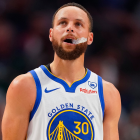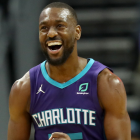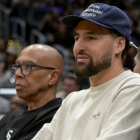You probably missed the Orlando Magic's 120-95 loss to the Los Angeles Clippers on Nov. 2, in which Aaron Gordon scored just four points on 2-for-5 shooting and after which Steve Clifford told reporters that their effort was not even close to being acceptable for a professional basketball team. It was the Magic's fourth loss in a row, and Gordon told The Athletic's Josh Robbins that he tortures himself psychologically after games like that.
You might see that quote and think, that doesn't sound healthy. Gordon does not disagree.
"That's a real immature way of dealing with a bad game," Gordon told CBS Sports. "You know, it's not healthy, man. It's really not healthy, over an 82-game season. You don't want to be too hard on yourself. You gotta just let it go. Don't be so emotional about it."
Judging by his 26-point, eight-rebound performance in Orlando's 117-110 victory in San Antonio two days after the Clippers loss, Gordon found a way to move on. At shootaround before Orlando embarrassed the New York Knicks with a 115-89 win on Sunday, Gordon discussed his mental approach and his past struggles with anxiety. The conversation has been lightly edited for clarity and flow.
CBS Sports: Stories written about you always bring up the fact that you've had a mental skills coach for a long time. Is part of this the fact that you were always hard on yourself?
Aaron Gordon: Yeah. Exactly. That's part of it. I was always really hard on myself. Whether it was a good game or a bad game, I would carry it with me for too long. The game would be over, and I'd still be thinking about basketball. Which is normal -- as players, we love our craft, we love to do what we do. I was just thinking about it too much. It was affecting me at home. I would come home and I would be irritable with my siblings or irritable with my mom or dad or the people that I love in my life. Food wouldn't taste as good. Music wouldn't sound as good. I was just putting way too much emotion into statistics and the wrong things. And it's really, like, it's just like being in a mental prison.
CBS: If I tell people I meditate, they're like, "OK, cool." When athletes do, it's like this big story. But when everyone says so much of the game is mental, shouldn't working on the mental side be normal? It seems sort of obvious to me.
AG: It seems obvious to me, too. Growing up, they always said pro sports is like 80 percent mental and 20 percent physical. So, it seems obvious. You know? They always say that, but they don't do nothing about it.
CBS: What does it say about the way people think about athletes that this stuff is still seen as sort of a new frontier?
AG: People forget that we're still people. They see us, they glorify us, they watch us and it seems like we're more than just people. But at the end of the day, we're just people playing a sport. With being a person comes times of suffering, you know? And, sometimes, depression, regardless of whether you're playing under bright lights or sitting in the crowd watching. And so everybody is going through something and there's ways to cope.
CBS: How have your feelings about where basketball fits in in your life changed over time?
AG: I thought basketball was the source of my happiness -- and it is, I'm not going to say that it's not a source. But it was almost the end-all, be-all of my happiness. It was too much. It was too much of my life, to the point where, like, something that was supposed to be pure and joyful was making me miserable. I mean, you always gotta grow with failure. You gotta fail forward, fail upwards. Any failure you have is a step onto something bigger and better for you. And yeah, if you think you're a basketball player and that's it and you forget about the human aspect, you're going to have a monumental collapse at some point in your life. At some point, you'll have a breakdown, you'll have an identity crisis. You know? And it will be depressing.
CBS: When you mentioned being miserable, is that referring to losing earlier in your career?
AG: Just pressing. Definitely losing. Pressing. You know, going out there and not being true to myself, not being true to who I am and who I can be as a player.
CBS: How do you find the balance between being a cerebral player and simply finding flow within the game?
AG: The game, you gotta flow, man. You gotta just play. You can't think too much in the game. Obviously, like, you want to think the game in terms of, like, making the right play, but when you've been doing this for so long, it just happens. It just happens. The more you let it happen, the better it goes. I'm just trying to trust myself, you know?
CBS: Before you step on the court, how conscious are you of your mood? How do you channel your thoughts to have the frame of mind that you want?
AG: I'm super conscious these days. Super conscious. Definitely watching my thoughts these days. You go with the foundation of allowing things to be how they are. I'm not trying to change things. I'm not trying to change people. I'm not trying to change who we're playing and how we're playing. I'm just allowing everything to be as it is.
CBS: What are you doing better this season than ever before?
AG: I'm just trying to relax. I've been so, almost manic and anxiety-filled growing up and playing the sport. It's hard to play that way. It's stressful to play that way, and it's not a fun [way], it's not a pure way to play basketball. Basketball is supposed to be played relaxed, to enjoy and to have fun and to absorb. When you're manic and you're anxious, you miss some things.


















